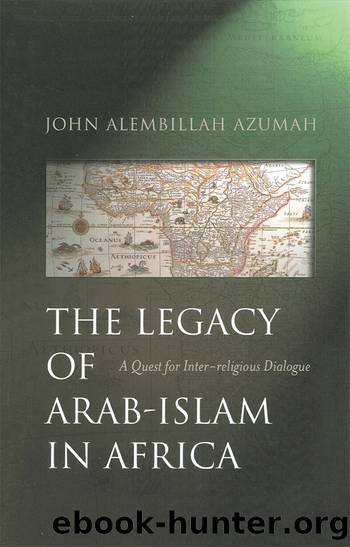The Legacy of Arab-Islam in Africa by John Allembillah Azumah

Author:John Allembillah Azumah
Language: eng
Format: epub
Publisher: Oneworld Publications
THE IMAGE OF BLACKS IN LIGHT-SKIN MUSLIM SOURCES AND SOCIETIES
In pre-Islamic Arab poetry and historical narrative, blacks â who at this stage were by and large Ethiopians â were usually referred to as Habash, the Arabic name from which the term âAbyssinianâ is derived. There is hardly any trace of antagonism or discrimination on the basis of the skin colour in pre-Islamic and early Islamic Arabia. In line with this pre-Islamic and early Islamic period, the Qurâan, apart from one instance where the colours black and white are used in an idiomatic sense to depict evil and good respectively,70 expresses no prejudice in matters of race or colour. Indeed, the Qurâan makes no specific reference to blacks, Africa or Abyssinia.
In social life in pre-Islamic and early Islamic Arabia there were black slaves as well as white slaves, mainly captured during war, and there is no evidence that the former suffered any specific discrimination by virtue of the colour of their skin. On the contrary, the Habash, who were active in sixth-century Arabia as allies of the Byzantines, were usually regarded as people with a higher civilization than the Arabs and respected during early Islamic times as people with a revealed religion. It was partly due to the high esteem with which the Habash were held in the early Islamic period that Muhammad advised his persecuted followers to seek asylum in Abyssinia in 615 CE.
The second caliph, âUmar ibn al-Khattab, the conqueror of Palestine and Egypt, âAmr ibn al-As and several other Companions of Muhammad are known to have had black-African traits in their ancestral lines.71 However, after the death of Muhammad and the early Muslim conquests, there developed what Bernard Lewis describes as âan inherent and continuing contradiction between Islamic doctrine on the one hand and the social reality on the otherâ in the attitude of Arab and subsequently, other light-skinned Muslim societies towards blacks.72
The hadiths generally insist on the equality of all men in Islam before God. There are, however, a considerable number of hadiths, even though technically termed âweakâ in that doubts have been cast over their authenticity as reflecting Muhammadâs or his early Companionsâ views, that nevertheless constitute important evidence for contemporary Muslim attitudes. A number of these hadiths deal with race and colour with some specifically condemning other races, especially the black race.
One such hadith reports Muhammad as having said of the Ethiopian: âWhen he is hungry he steals, when he is sated he fornicates.â Sometimes some of these hadiths have an eschatological dimension, as for instance when Muhammad is quoted as having predicted that the Kaâba would one day be destroyed by âBlack-skinned, short-shanked menâ, who will tear it apart and begin the destruction of the world.73 Referring to this hadith, the head of the Ahmadiyya Muslim Mission in Ghana, Maulvi Wahab Adam, identifies the âBlack-skinned, short-shanked menâ as Africans of Abyssinian origin and writes:
The Kaâabah symbolises the unity of Allah. It is the symbol of Islam. It stands for Muslim solidarity. It represents all that is dear to all true Muslims.
Download
This site does not store any files on its server. We only index and link to content provided by other sites. Please contact the content providers to delete copyright contents if any and email us, we'll remove relevant links or contents immediately.
| Hadith | History |
| Law | Mecca |
| Muhammed | Quran |
| Rituals & Practice | Shi'ism |
| Sufism | Sunnism |
| Theology | Women in Islam |
The History of Jihad: From Muhammad to ISIS by Spencer Robert(2622)
Nine Parts of Desire by Geraldine Brooks(2361)
The Turkish Psychedelic Explosion by Daniel Spicer(2355)
The First Muslim The Story of Muhammad by Lesley Hazleton(2268)
The Essential Rumi by Coleman Barks(2043)
1453 by Roger Crowley(2024)
The Last Mughal by William Dalrymple(1855)
Trickster Travels: A Sixteenth-Century Muslim Between Worlds by Davis Natalie Zemon(1847)
Muhammad: His Life Based on the Earliest Sources by Martin Lings(1644)
God by Aslan Reza(1639)
by Christianity & Islam(1629)
A Concise History of Sunnis and Shi'is by John McHugo(1567)
No God But God by Reza Aslan(1541)
Magic and Divination in Early Islam by Emilie Savage-Smith;(1533)
The Flight of the Intellectuals by Berman Paul(1502)
Nothing to Envy by Barbara Demick(1445)
Art of Betrayal by Gordon Corera(1429)
What the Qur'an Meant by Garry Wills(1391)
Getting Jesus Right: How Muslims Get Jesus and Islam Wrong by James A Beverley & Craig A Evans(1340)
